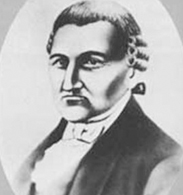David Brearley served as the Chief Justice of the Supreme Court of New Jersey and represented the state at the Constitutional Convention. Under his leadership, the “Brearley Committee” shaped a powerful executive branch, created the vice-presidency, and formed the Electoral College.
Early Life
Brearley was an ardent revolutionary and was arrested by the British for high treason. When the war for independence broke out, he served in the Monmouth County militia and eventually rose to the rank of colonel.
New Jersey Supreme Court Chief Justice & Constitutional Convention
In 1779, Brearley was elected as chief justice of the New Jersey Supreme Court and held the position for nearly a decade. One year later, he wrote the court’s precedential decision in Holmes v. Walton, which was the first case in the United States in which a court held a statute unconstitutional.
Brearley was nominated to represent New Jersey at the Constitutional Convention. In his description of the Founding Fathers, William Pierce wrote of him:
Mr. Brearley is a man of good, rather than of brilliant parts. He is a Judge of the Supreme Court of New Jersey and is very much in the esteem of the people. As an Orator he has little to boast of, but as a Man he has every virtue to recommend him.
Later Career
Brearley served as the Chairman of the Committee of Leftovers, which was tasked with addressing a number of important issues that remained unresolved, most importantly the office of the President. Pursuant to the proposals of the “Brearley Committee,” the President was selected by the Electoral College. The committee shortened the term to four years, but made the President eligible for re-election. The committee also elevated the executive office among the three branches of government by reassigning certain duties from Congress to the President, including the power to appoint judges, cabinet officers, and ambassadors
After the signing of the Constitution, Brearley presided over the New Jersey ratifying convention, where he lobbied the state to approve the Constitution. On December 18, 1787, New Jersey become the third state to ratify. Brearley’s public service continued in the new government. President George Washington nominated Brearley as a Federal District Judge in 1789, he served in this position until he died in 1790.








